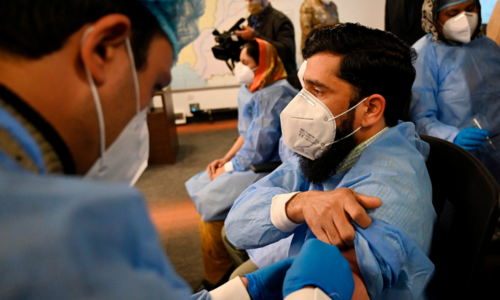Coronavirus immunizations cut danger of genuine disease by 80% in over-80s
The Public Health England information showed the impact kicked in three to about a month after inoculation.
It depended on individuals matured more than 80 who were the first to get the hit.
Government researchers hailed the outcome, yet focused on that two dosages were required for the best insurance.
It comes after comparable discoveries were distributed by Scottish wellbeing specialists a week ago, which they hailed as "terrific".
When will it be my chance to be inoculated?
More than 20m in UK have had first Covid poke
Brazil 'variation of concern' found in UK
Wellbeing Secretary Matt Hancock told a Downing Street instructions on Monday the most recent antibody results were "solid".
He added: "They may likewise assist with clarifying why the quantity of Covid admissions to concentrated consideration units among individuals more than 80 in the UK have dropped to single figures over the most recent few weeks."
Additionally talking at the news meeting, England's vice president clinical official - Prof Jonathan Van-Tam - said the information offered a brief look at how the antibody program "will ideally bring us into an altogether different world in the following not many months".
In any case, he said it was "totally basic" that subsequent dosages "are still essential for the course of vaccination against Covid-19 and no less significant".
Prof Van-Tam focused on there was a "critical probability" that a second portion of an immunization would "develop your resistant reaction, potentially make it more extensive and very likely make it longer than it would some way or another be comparable to a first portion as it were."
In excess of 20 million individuals in the UK have had their first portion of an antibody - over 33% of the grown-up populace.
Then, another 104 passings inside 28 days of a positive Covid have been accounted for in the UK, and a further 5,455 new cases, as per the most recent figures.
The PHE information, which has not been peer evaluated, additionally recommended the Pfizer immunization, what began being revealed a month prior to the AstraZeneca antibody, prompts a 83% decrease in passings from Covid. This depended on individuals beyond 80 years old who had kicked the bucket.
The information likewise showed immunization cuts the danger of individuals more than 70 building up any Covid side effects by around 60%, three weeks after an underlying portion.
Prof Van-Tam said the choice to give the AstraZeneca antibody to more seasoned individuals was "obviously vindicated".
Some European countries have would not offer it to the over 65s in light of the fact that information from the preliminaries was basically on its impact among more youthful grown-ups.
Prof Van-Tam said the judgment made by the UK specialists was that it was basically "not conceivable" the immunization would just work on more youthful grown-ups.
He said different nations would without a doubt be "exceptionally intrigued" in the information emerging from the UK.
Dr Mary Ramsay, Public Health England's head of inoculation, said there was developing proof that the antibodies were attempting to decrease contaminations and save lives.
"While there stays substantially more information to follow, this is empowering and we are progressively sure that immunizations are having a genuine effect," she said.
Nonetheless, more proof is had to realize how well the immunizations secure against the Brazil variation that has as of late been distinguished in the UK.
This variation has a transformation - E484 - that could decrease a portion of the viability of the immunizations.




Comments
Post a Comment